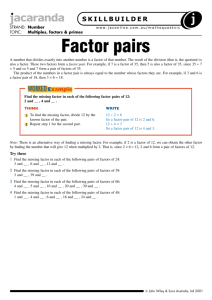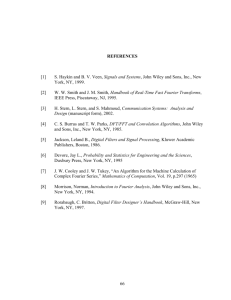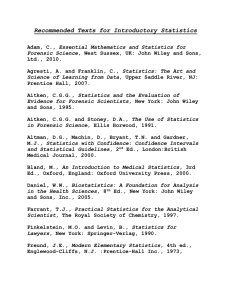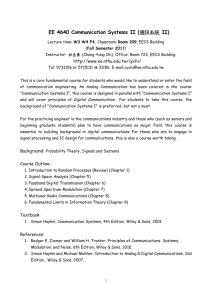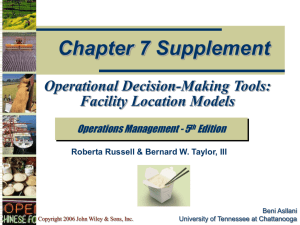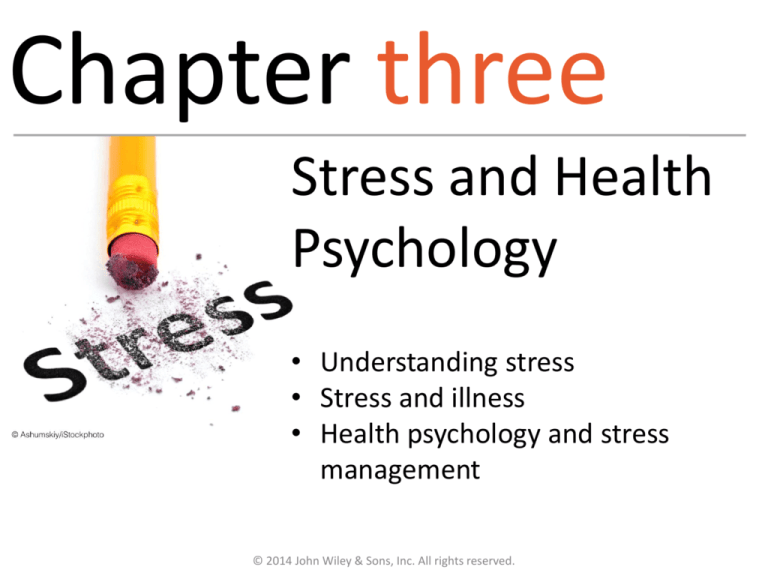
Chapter three
Stress and Health
Psychology
• Understanding stress
• Stress and illness
• Health psychology and stress
management
© 2014 John Wiley & Sons, Inc. All rights reserved.
realworldpsychology
Things You’ll Learn in Chapter 3
Q1
Does the use of social media lead to stress?
Q2
Can loneliness make you sick?
Q3
Are people with stressful jobs at increased risk of
experiencing a heart attack?
Q4
Does watching televised coverage of natural
disasters increase symptoms of posttraumatic
stress disorder?
Q5
Could thinking about the “silver linings” of a
stressful event, or sharing it with others, reduce
depression?
© 2014 John Wiley & Sons, Inc. All rights reserved.
What is Stress?
• Stress = the interpretation of specific events as
threatening or challenging
• Stressor = trigger or stimulus that induces
stress
What
stressors
cause stress
for you?
© 2014 John Wiley & Sons, Inc. All rights reserved.
realworldpsychology
© 2014 John Wiley & Sons, Inc. All rights reserved.
Chronic Stress
• Chronic stress = continuous state of arousal
where demands are perceived as greater than
resources available
• Significant source of negative stress
• Examples?
War, poverty, discrimination, poor
working conditions, repressive
political climate, environmental
discomfort/noise
© 2014 John Wiley & Sons, Inc. All rights reserved.
realworldpsychology
Q1
Does the use of social media lead to
stress?
• Social life can be both rewarding and stressful,
even online. Survey of college student attitude
about Facebook (Charles, 2011):
– Facebook makes them anxious
– Delay responses to friend requests
– Rejecting friend requests creates guilt
© 2014 John Wiley & Sons, Inc. All rights reserved.
Conflict as Stressor
• Approach-approach = choosing
between two desirable options
• Avoidance-avoidance = choosing
between two undesirable options
• Approach-avoidance = one option
has both positive and negative
characteristics
© 2014 John Wiley & Sons, Inc. All rights reserved.
A little can feel like a lot
• Hassles = minor problems in daily life can add
up to be a major stressor
• Burnout = physical, mental, and emotional
exhaustion from persistent hassles
• Frustration = negative emotional state arises
from blocked goal
– The more motivated we are, the more frustrated
we are when goal is blocked
© 2014 John Wiley & Sons, Inc. All rights reserved.
Effects of Stress
General Adaptation Syndrome (GAS) – Hans Selye
• Bodies are well designed for temporary stress, but poorly
prepared for chronic stress
• Three phases: alarm, resistance, exhaustion
• BUT, not all stressors have similar effects
© 2014 John Wiley & Sons, Inc. All rights reserved.
Stress and Illness
• Cortisol is released to help you fight stressor, but
chronically high cortisol suppresses the immune
system
• Pyschoneuroimmunology = studies effects of
psychological and other factors on the immune
system
Q2
Can loneliness make you sick?
• Loneliness is a chronic stressor that
can impair the immune system
(Jaremka et al., 2013)
© 2014 John Wiley & Sons, Inc. All rights reserved.
realworldpsychology
Even short-term stress affects cognitive
functioning
• Restricts the retrieval of existing memories,
impedes the creation of new memories
• How can you apply this?
– Can stress of exam affect memory?
– Difficult to think clearly during
an emergency?
© 2014 John Wiley & Sons, Inc. All rights reserved.
realworldpsychology
Long-term stress has severe cognitive effects
• Permanent damage to hippocampus
• Damaged hippocampus can’t provide
feedback to hypothalamus, so cortisol
continues to be released
© 2014 John Wiley & Sons, Inc. All rights reserved.
STRESS AND ILLNESS
How stress is related to four serious illnesses:
• Gastric ulcers
• Cancer
• Cardiovascular disorders
• Posttraumatic stress disorder
© 2014 John Wiley & Sons, Inc. All rights reserved.
Gastric Ulcers
• Ulcers = lesions to the lining of the stomach
and upper small intestines
• Stress itself does not cause ulcers
• Bacterium (H. plyori) damages stomach wall
and can be helped with antibiotics
• BUT, 75% of control subjects (no ulcers) also
have the same bacterium
• So, bacteria cause ulcers ONLY in people
compromised by stress (Fink, 2011)
© 2014 John Wiley & Sons, Inc. All rights reserved.
Cancer
• Cancer occurs when cells divide rapidly,
forming a tumor and invading healthy
tissue
• Immune system checks the uncontrolled
growth by attacking abnormal cells
• If immune system is compromised by stress, it is less
able to fight cancerous growth
• Note: research does not show that stress causes
cancer or that positive attitudes can fight it off, but
does show that stress increases the spread of cancer
cells to other organs
© 2014 John Wiley & Sons, Inc. All rights reserved.
Cardiovascular Disorders
• Heart disease includes coronary heart disease,
angina, heart attack
• Stress hormones (cortisol and adrenaline) in the
bloodstream increase heart rate and send fat and
glucose into the blood for energy
• If no physical activity occurs (fight or flight), fat in
bloodstream sticks to walls of blood vessels
Q3
Are people with stressful jobs at
increased risk of experiencing a heart
attack?
• Job-related stress = 23% more likely to have heart
attack
© 2014 John Wiley & Sons, Inc. All rights reserved.
Personality Variables
• Type A – intense, ambitious, driven
personality. Higher stress if hostility is
included. More interpersonal conflicts
• Type B – less competitive, more relaxed, less
stress
• Positive Affect/Emotion – people with
general happiness, joy, enthusiasm have fewer
colds, strokes, and longer life expectancy
© 2014 John Wiley & Sons, Inc. All rights reserved.
Posttraumatic Stress Disorder (PTSD)
• Exposure to serious trauma (not just military service)
or recurring exposure
• Recurrent memories, dreams, flashbacks
• Persistent avoidance of stimuli related
to event
• Negative changes in mood, negative
self-thought, detached from others
• Irritability, anger, reckless behavior,
sleep disturbances
© 2014 John Wiley & Sons, Inc. All rights reserved.
PTSD
Q4
Does watching televised coverage of natural
disasters increase symptoms of posttraumatic stress
disorder?
• Simply watching TV coverage of natural
disasters can increase PTSD symptoms,
especially in kids
© 2014 John Wiley & Sons, Inc. All rights reserved.
HEALTH PSYCHOLOGY AND
STRESS MANAGEMENT
Health psychology studies how people stay healthy, why they
become ill, and how they respond to illness
© 2014 John Wiley & Sons, Inc. All rights reserved.
What Health Psychologists Do
• Study the effects of stress on the immune
system
• Goal: reduce psychological distress and
unhealthy behaviors
• Employed by medical centers and as
independent consultants
• Educate public about health maintenance
© 2014 John Wiley & Sons, Inc. All rights reserved.
Coping with Stress
• Problem-focused coping:
decrease or eliminate
stressor
• Emotion-focused coping:
relieve or regulate
emotional reaction when
stressor can’t be changed
© 2014 John Wiley & Sons, Inc. All rights reserved.
Coping
Q5
Could thinking about the “silver linings” of a stressful
event, or sharing it with others, reduce depression?
• Even though emotion-focused coping doesn’t
change the problem, thinking about the
benefits of the stressful event increases
positive mood
• Must reflect accurate reappraisal, not be
overused, and not distort reality
© 2014 John Wiley & Sons, Inc. All rights reserved.
Resources for Healthy Living
• Positive attitude leads to view
of stress as enhancing/
adaptive rather than
debilitating
• Locus of Control (LOC)
– Internal LOC = belief that you
control your own fate leads to
effective decisions and healthy
lifestyle
– External LOC = belief that outside
forces control fate, leading to
powerlessness, higher stress
© 2014 John Wiley & Sons, Inc. All rights reserved.
Resources for Healthy Living
• Mindfulness-based stress reduction (MBSD): training
consciousness to attend to ongoing events in
nonjudgmental way
• Social support: people with greater social support
have better health outcomes, greater psychological
and physical well-being, faster recovery, and longer
life expectancy
realworldpsychology
After surgery, those with more social support have less
anxiety, fewer narcotics, are released from hospital
sooner
© 2014 John Wiley & Sons, Inc. All rights reserved.
© 2014 John Wiley & Sons, Inc. All rights reserved.
© 2014 John Wiley & Sons, Inc. All rights reserved.
© 2014 John Wiley & Sons, Inc. All rights reserved.
© 2014 John Wiley & Sons, Inc. All rights reserved.

